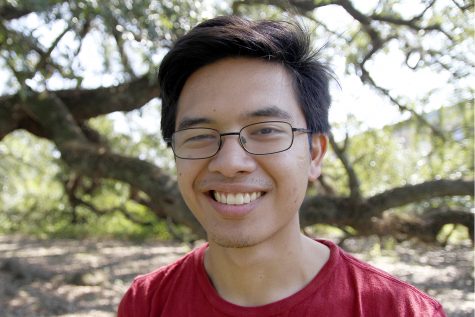
Senior social work major Dustin Pounds offers his input on human trafficking at the Regional Human Trafficking Summit. Zachary Araki/The Lion's Roar
Governor John Bel Edwards and the LA Human Trafficking Prevention Commission hosted the Regional Human Trafficking Summits to improve the state response to human trafficking.
The sixth in a series of nine summits was held in the War Memorial Student Union Ballrooms B and C on Feb. 22 starting at 8 a.m. The Department of Children and Family Services, the Louisiana Alliance of Children’s Advocacy Centers, Louisiana State Police, HP Serve, and the Human Trafficking Prevention Commission collaborate in these summits to gain information from separate regions on their responses to human trafficking.
Liaison for LACAC Kate Shipley said, “The purpose of the series of summits is to create a statewide assessment of where we are in Louisiana related to human trafficking in terms of current services, resources, strengths, but it’s taking a regional approach where we’re going to each of the nine regions, talking with agency leaders and boots on the ground and people that work the cases to get their perspectives on what they think for their region, their current successes as well as the current needs, the gaps, and what they need.”
Senior social work major Dustin Pounds discussed the importance of the summit.
Pounds said, “It’s getting some exposure on a much needed topic that needs to have exposure, bringing in some of the right resources to get the different services and agencies together, start thinking together, start operating together to attack this problem in a way that we’re not just gonna make it a lip service.”
Seeing human trafficking around the world as retired military police contributed to Pounds’ decision to attend the summit.
“This is something that I have been passionate about for quite a few years, and it’s something that continues to be a problem,” said Pounds. “Traveling around the world a few times, it’s everywhere I’ve been. So, seeing this was coming up and being invited by my instructor, I really wanted to attend this to be a part, to learn, get some other ideas, see what’s involved, what’s available and potentially give some input as well.”
One aim of the summit is to improve existing efforts regarding human trafficking.
“Like we learned today, there’s already a great collaborative effort that’s happening,” said Shipley. “So the goal wouldn’t be to recreate something that’s already there but just to enhance current efforts and current programs.”
Pounds explained what response to human trafficking he would like to see.
“Problems can tend to be solved at the smallest level,” said Pounds. “Where an individual needs help, that starts with the family. From the family, it spreads out to the community. From the community, it goes out even farther, and eventually it’s state and even federal. With this, if we can get each community to react in that family concept when dealing with this, it can save time. It can save some effort.”
The next summit is scheduled for March 8 at Lakeview Christian Center in New Orleans. Shipley discussed the regional differences she has seen from the summits.
“Every region is in a very unique place I would say,” said Shipley. “Some are just starting out in terms of where they are with human trafficking services. Some have been doing this work for a long time, have had specialized positions for a long time. So, by going to each region, it’s learning about what the need is in order to make a more educated plan for how to improve services for victims.”


